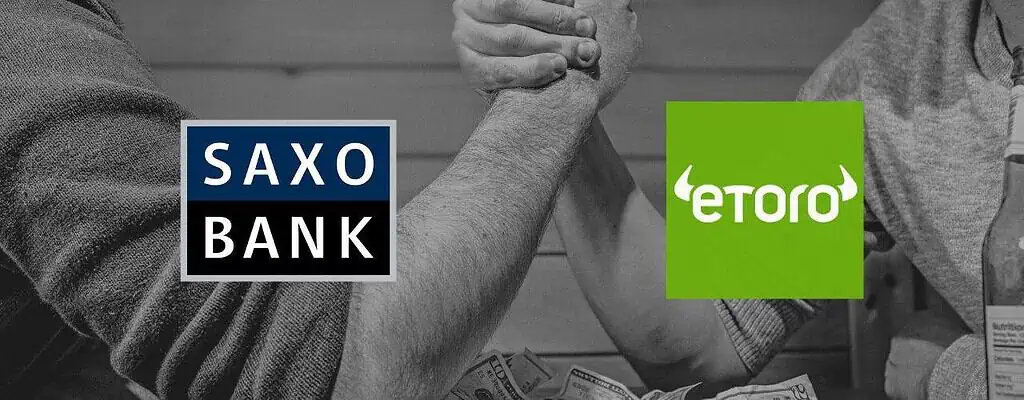Whether you’re contemplating switching brokers or selecting one for the first time, eToro and Saxo are two names you are supposed to consider. Both of these brokers are market leaders in their own rights, but unfortunately, there can only be one. To help you decide between the two, this comparison will assess the brokers on the 5 most important aspects of forex services.
Forex regulation
This content is not intended for US users. eToro USA LLC does not offer CFDs, only real Crypto assets available.
Saxo was among the first Forex brokers to offer its services to retail clients. The company was founded in 1992 but started offering retail FX trading in 1998. It was launched and is still headquartered in Denmark, although the company has subsidiaries in various locations. In total, Saxo has 12 licenses to operate as a Forex broker. Some of the notable locations include
- the UK where the subsidiary Saxo Capital Markets UK has Firm reference number 551422 from the FCA
- Saxo Capital Markets (Australia) Pty. Ltd registered by ASIC under Registration Number: 126373859
- Saxo Capital Markets Singapore licensed by MAS under Company Registration Number: 200601141M
In Denmark where the company is founded, Saxo received a banking license in 2001 to become Saxo Bank A/S and the Danish FSA regulates the company.
On the other hand, eToro is relatively new to the industry but it has still managed to have several subsidiaries around the world. Some of these include:
- European subsidiary licensed by CySEC
- UK-based subsidiary licensed by the FCA
- Australian subsidiary licensed by ASIC
The winner is Saxo because of a long history and licenses from more financial regulators.
Funding methods
You obviously cannot trade without making a deposit, and these two brokers allow various deposit methods. For Saxo clients, they can choose between wire transfer, credit card and a variety of local funding methods that depend on the location. For instance, clients in Singapore can use methods such as FAST, PayNow and MEPS. Most deposit methods do not have any additional transaction fees, but some do such as cheques that require a USD 50 handling fee. The minimum deposit fee ranges from $600 to $10,000 depending on the location.
Not to be left behind, eToro also availed various funding methods including credit card, wire transfer, electronic wallets such as PayPal and Skrill as well as local funding methods depending on the location. eToro charges a fixed withdrawal fee of $5 USD, Additionally, a conversion fee may be applied as withdrawals and deposits are conducted in USD. Any other currency will have to be
The winner in this category is eToro.
Assets available
There are a lot of financial products that can be traded in the financial markets, and both Saxo and eToro provide many of these assets. In fact, there are a lot of similarities between these two brokers who offer Forex, stocks, bonds, futures, ETFs, and CFDs on various instruments. However, looking at the number of products in each category will clearly show that Saxo has a wider selection. Besides, Saxo also has Forex and listed options in addition to the other products, making the asset list longer compared to that from eToro.
Thus, the winner is clearly Saxo.
Trading platforms
Traders on eToro rely only on a web trader and mobile apps available for iOS and Android. The web trader from eToro is very robust and efficient to handle the many financial instruments available from the broker. It also handles all the features unique to eToro such as copy trading and copy funds so you never miss anything.
Saxo was initially meant for professional traders and only later started to accommodate retail traders, it offers different trading platforms depending on the client. SaxoTraderGO is a web-based platform meant for amateur traders while SaxoTraderPRO is a downloadable app for more experienced traders. There is an even simpler platform for the casual trader and a complex app complete with an API for professional traders.
Winner in this category is Saxo for having multiple trading platforms.
Overall winner
When all the above is considered, Saxo emerges as the clear overall winner and the preferred broker for most retail traders.
